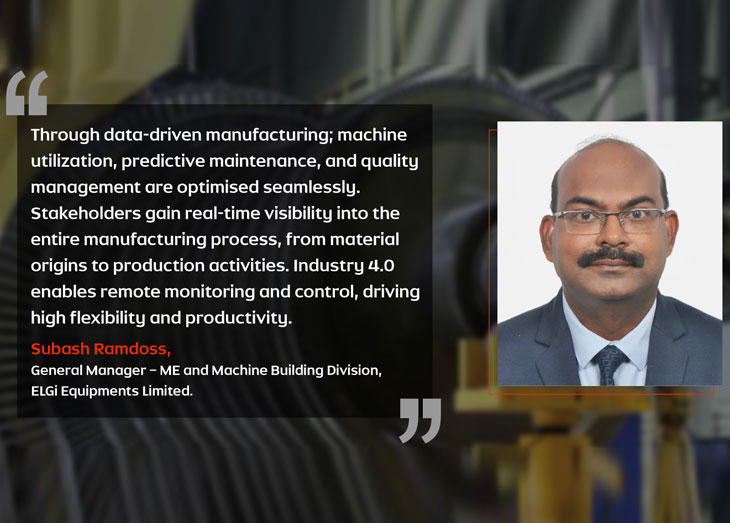EMBRACING INDUSTRY 4.0 : THE FUTURE OF HEAVY MACHINERY MANUFACTURING

HEAVY MACHINERY MANUFACTURERS WHO ARE ON THE VERGE OF DIGITAL TRANSFORMATION ARE UNLOCKING RAPID AND SUSTAINABLE CHANGE WITH INDUSTRY 4.0
THE GLOBAL MANUFACTURING INDUSTRY IS going through a serious digital transformation called Industry 4.0 and the heavy machinery manufacturing sector is undergoing a profound transformation.
Manufacturers in the heavy machinery industry are harnessing the power of automation, data analytics, and connectivity to optimise their operations and deliver superior products. The adoption of smart manufacturing practices brings three key advantages to the sector:
1. Cost reduction through connectivity: Increasing connectivity within the heavy machinery and equipment industry yields significant cost-saving benefits. By monitoring smart tools and tracking their usage, managers can implement proactive measures to replace tools before they malfunction or break down, preventing downtime and reducing maintenance expenses.
2. Enhanced efficiency and quality: Minimising human errors and ensuring the reliability of tools and equipment greatly improves efficiency and product quality on the production line. This not only reduces downtime but also provides manufacturers with the flexibility to adapt their processes. Additionally, the abundance of data enables the replication of factories in new markets, expanding market reach.
3. Predictive maintenance and downtime reduction: As data transparency increases, predictive maintenance becomes applicable to everyday operations. By using smart tools and software in manufacturing, heavy machinery and equipment companies can proactively address maintenance needs, minimising downtime and associated costs in the field.
THE ROLE OF IIOT IN INDUSTRY 4.0 IMPLEMENTATION
The Industrial Internet of Things (IIoT) plays a crucial role in facilitating the implementation of Industry 4.0 by enabling data capture and processing for industrial automation. In the context of heavy equipment manufacturing plant floors, IIoT hardware and software provide solutions to overcome communication challenges posed by legacy systems. Smart devices like human-machine interfaces and Edge hardware enable capturing data from these legacy systems.
“Industry 4.0 solutions offer substantial benefits for heavy machinery manufacturing industries, fostering a connected ecosystem of people, machines, processes, and information. Real-time data access empowers quicker decision-making and even autonomous operations. Energy-intensive heavy engineering units can leverage Industry 4.0 for real-time energy monitoring, yielding significant energy and carbon footprint savings. Through data-driven manufacturing, machine utilization, predictive maintenance, and quality management are optimised seamlessly. Stakeholders gain real-time visibility into the entire manufacturing process, from material origins to production activities. Industry 4.0 enables remote monitoring and control, driving high flexibility and productivity.,” says Subash Ramdoss, General Manager – ME and Machine Building Division, ELGi Equipment.
MANUFACTURING TODAY


